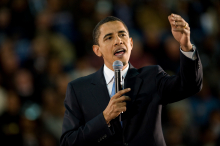In the first part of this three part series, my colleague Ellie Shockley described how rational thinking may drive political attitudes and voting behavior. In the second part of the series, Matt Moytl described how emotion may drive political attitudes and voting behavior. In the final part of this series, I discuss how emotions and reasons are not necessarily in conflict.
In the first part of this three part series, my colleague Ellie Shockley described how rational thinking may drive political attitudes and voting behavior. In this second part of the series, I describe how emotion may drive political attitudes and voting behavior. In the final part of this series, Mark Brandt will discuss how emotion and reason each contribute to people’s political attitudes and behaviors.
If your citizenship comes with the responsibility - and privilege - of voting, then every few years you face an interesting challenge. Who will you vote for? Whether you choose to support an incumbent, a celebrated war hero, an experienced government official, or a new face on the political scene, psychologists are incredibly curious about the process by which you come to that decision. There is reason to believe that, coming from a thoughtful and prepared voter, your ballot will reflect an objective assessment of candidate qualifications.
Issue

